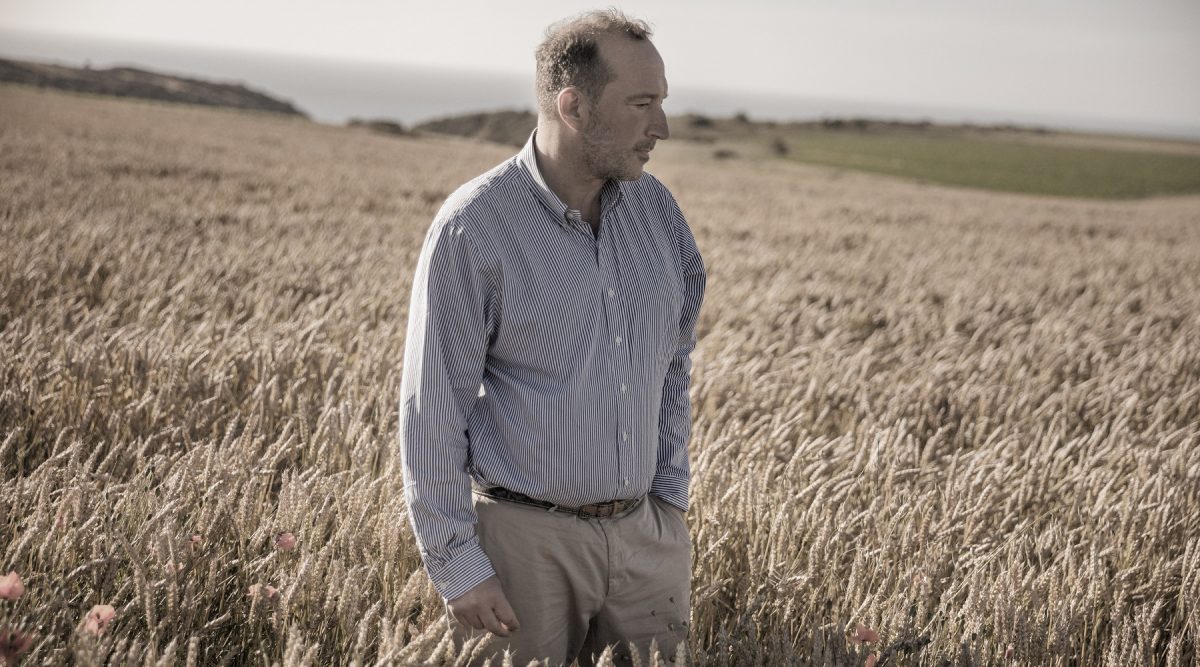
Жил Парис (Gilles Paris)
Version française
English version
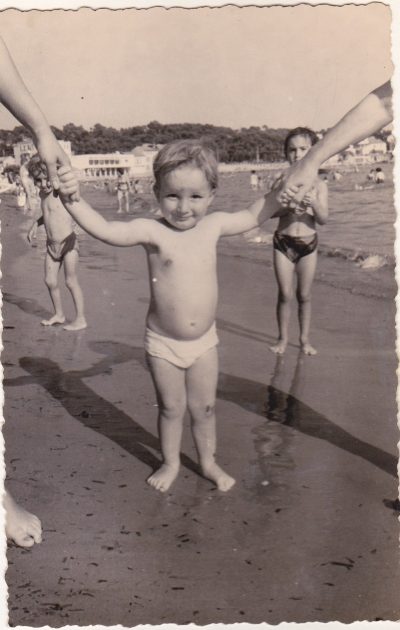
Малко преди гостуването си в София и срещата с детските си читатели у нас, Жил Парис ни изпрати любимия си спомен от детството, запечатан на лента
Жил Парис е един от най-сладкодумнните френски писатели. В България го познаваме с романа „Животът ми като Тиквичка“.
На Софийския международен литературен фестивал за деца и младежи ще се срещнем с него и книгите му.
Ще имаме възможност също да се насладим на пълнометражната анимация „Животът ми като Тиквичка” с режисьор Клод Барас, номинирана през 2016 г. за Оскар за анимационен филм.
Дотогава, с искрен интерес, възхищение и любопитство го питаме:
Симон, един от любимите ни герои от „Животът ми като тиквичка“ знае всичко за другите, но нищо за себе си. А Вие какво знаете за себе си? Как бихте се представил на едно дете?
След повече от двадесет години на анализи, се опознах по-добре. Но човешката природа е толкова парадоксална и неочаквана, че е трудно наистина да познаваш себе си добре, да не говорим за другите. Част от мен остана много невинна, приписвам го на детството си. Аз съм контрабандист на емоции. Прес аташе. И писател.
Как започнахте да пишете?
Бях на около дванадесет години. Писал съм стихове, новини, обикнах свободата да пиша и да въвличам несъзнаваното.
Кои са любимите Ви теми? Споделя сте, че „Смъртта и болестите, които обхващам във всичките си романи, не са щастливи теми, но винаги подхождам към тях с желание да не драматизирам, не искам да натискам там, където боли“. Може ли да ни кажете повече за подхода си?
Мисля за семейната дисфункция, за всичко, което дестабилизира семейството, болест, гняв, недоразумения. Представил съм ги чрез детския глас, без да драматизирам, в първите си четири романа. В последния, многогласов роман, Le vertige des falaises, има повече възрастни, те също изразяват себе си. Това е по-тъмен роман, който тийнейджърът дърпа към светлината.
Писането за деца по-трудно ли Ви се струва от това за възрастни?
Не, защото писах, сякаш съм в главата на дете, почти четиридесет години. Свикнах да пиша на този език. По-скоро с Le vertige des falaises писането за възрастни ми се стори по-горчиво.
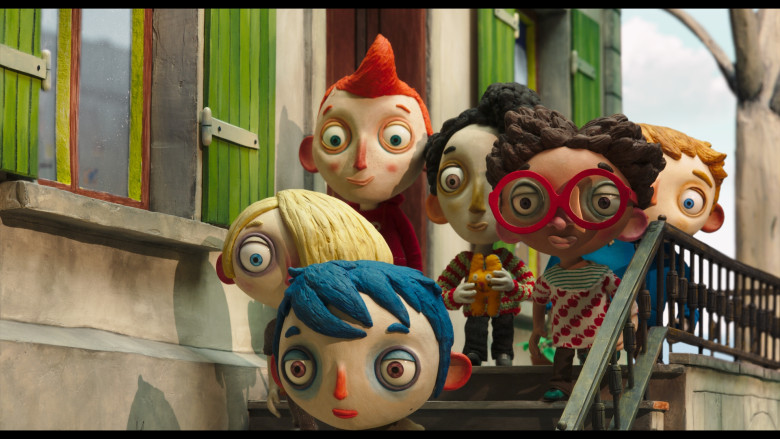
Кадър от анимацията „Животът ми като Тиквичка“/ снимка: RITA PRODUCTIONS/ BLUE SPIRIT PRODUCTIONS/ GEBEKA FILMS/ KNM/ RTS
„Щеше да е по-добре, ако [възрастните] се вслушваха в мълчанията ни“, казва Тиквичката. Вие вслушвате ли се в думите и мълчанията на децата?
Да, разбира се, както и в тези на възрастните. Мълчанието на възрастните казва много за тяхната самота, за трудността да се изразяват, за срамежливостта и страха. Също както и при децата, това не се променя.
„Понякога се налага да разтърсиш възрастните, за да разбудиш спящото в душата им дете“, си мисли Тиквичката. Има ли някаква рецепта за разбуждане на детето в нас?
Уви не! Някои възрастни израстват, носейки детството в себе си, други не.
Комбинирате откровените и трогателни разсъждения на децата с много хумор, естествена реч и динамичен диалог. Това ли е начинът да стигнете до децата? Да събудите възрастните?
За да говориш като дете, трябва да бъдеш такова. Няма друга алтернатива. Хуморът е най-добрата защита, призив да се отпуснеш, да се оставиш на течението. Малко възрастни го упражняват.
Испанският писател Сесар Майорки твърди, че „Литературата за деца, особено задължителната, трябва да бъде добра, но и съблазнителна“. Как можем да съблазним децата да четат повече?
Като им даваме наистина добри книги за четене, така че да не чувстват, че си губят времето.
„Когато остарея ще продължа да се чувствам като на десет и ще задавам взевъзможни въпроси“, размишлява Тиквичката. А Вие имате ли въпроси към българдките си читатели?
Позволете си да се потопите в света на децата, въпросите на Тиквичката може да са ваши…
Откъс от вълнуващия роман на Жил Парис:
Gilles Paris: Je suis un passeur d’émotion
Entretien avec Gilles Paris à l’occasion de sa visite au Festival littéraire international de Sofia pour enfants et adolescents
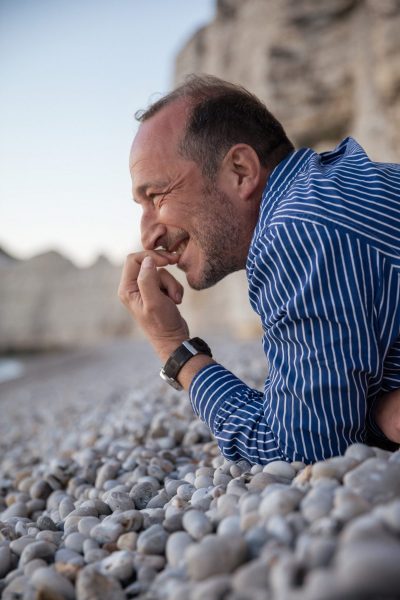
Gilles Paris
Simon, l’un de nos personnages préférés dans Autobiographie d’une courgette, sait tout sur les autres enfants, mais rien sur lui-même. Que savez-vous de vous? Comment vous présenteriez-vous à un enfant?
Après plus de vingt ans d’analyse, j’ai appris à me connaître mieux. Mais la nature humaine est si paradoxale et inattendue qu’il est difficile de vraiment bien se connaître soi-même, et à fortiori les autres.
Une part de moi est restée très innocente, je l’attribue en effet à, mon enfance. Je suis un passeur d’émotion. Un attaché de presse. Et un écrivain.
Comment avez-vous commencé à écrire?
J’avais à peu près douze ans. .J’écrivais des poèmes, des nouvelles, j’aimais déjà cette liberté d’écrire et de faire participer l’inconscient.
Quels sont vos thèmes préférés? Vous avez dit une fois que “ La mort et la maladie, que j’aborde dans tous mes romans, ne sont pas des thèmes joyeux mais toujours abordés avec une envie de les dédramatiser, je ne veux pas appuyer là où ça fait mal.“ Pourriez-vous dire plus sur votre approche?
Le dysfonctionnement familial je pense, tout ce qui destabilize une famille, la maladie, la colère, l’incompréhension. Par la voix de l’enfant je l’ai dédramatisé sur mes quatre premiers romans. Sur le dernier Le vertige des falaises, un roman choral, il y a davantage d’adultes qui s’expriment, un roman plus noir que l’adolescente tire vers la lumière.
Trouvez-vous plus difficile d’écrire pour les enfants que pour les adultes?
Non. Parce que j’écris dans la tête d’un enfant depuis près de quarante ans. Et je me suis habitué à écrire cette langue. C’est plutôt écrire comme un adulte qui m’a paru âpre avec Le vertige des Falaises.
„Il aurait été préférable que les adultes écoutent notre silence“, explique Courgette. Écoutez-vous les mots et le silence des enfants?
Oui bien sûr, et des adultes aussi. Le silence des adultes en dit beaucoup sur leur solitude, la difficulté de s’exprimer, la timidité, la peur, tout comme pour les enfants, ça ne change pas.
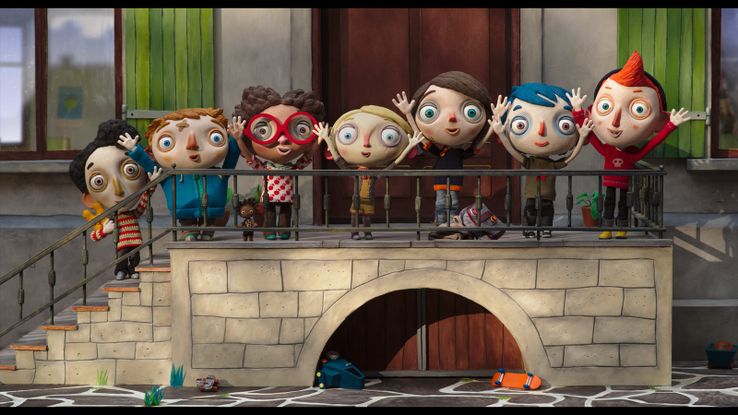
„Ma vie de courgette“ de Claude Barras, un film adapté d’un roman de Gilles Paris / Copyright: RITA PRODUCTIONS/ BLUE SPIRIT PRODUCTIONS/ GEBEKA FILMS/ KNM/ RTS
„Parfois, vous devez secouer les adultes pour réveiller l’enfant qui dort dans leur âme„, pense Courgette. Y a-t-il une recette pour réveiller cet enfant intérieur?
Hélas non. Certains adultes ont grandi avec leur enfance, d’autres non.
Vous combinez les réflexions franches et poignantes des enfants avec beaucoup d’humour, de discours naturel et de dialogues dynamiques. Est-ce le moyen d’approcher les enfants plus faciles? Pour réveiller les adultes?
Pour parler comme un enfant, il faut l’être. Pas d’autre alternative. L’humour est la meilleur des défenses, un appel à la détente, au lâcher prise. Peu d’adultes l’exercent.
L’écrivain espagnol César Mallorquí affirme que „la littérature pour les enfants, particulièrement obligatoire, devrait être bonne, mais aussi séduisante“. À votre avis, comment pouvons-nous séduire les enfants à lire plus?
En leur donnant de bons livres à lire, pour qu’ils n’aient pas le sentiment de perdre leur temps.
„Quand je serai grand, je continuerai à avoir dix ans et je poserai toutes sortes de questions„, explique Courgette. Avez-vous des questions pour vos lecteurs bulgares?
Laissez-vous embarquer dans le monde de l’enfance, les questions de Zucchini pourraient bien être les votres…
Gilles Paris: I am a smuggler of emotions
Interview with Gilles Paris on the occasion of his visit to the Sofia International Literary Festival for Children and Adolescents

Gilles Paris as a child
Simon, one of our favorite characters in Autobiography of a Zucchini, knows everything about the other children, but nothing about himself. What do you know about yourself? How would you introduce yourself to a child?
After more than twenty years of analysis, I got to know myself better. But human nature is so paradoxical and unexpected that it is difficult to really know oneself well, let alone the others.
Part of me has remained very innocent, I attribute it to my childhood. I am a smuggler of emotions. A press attaché. And a writer.
How did you start writing?
I was about twelve years old. I wrote poems, news, I already liked this freedom to write and to involve the unconscious.
What are your favorite themes? You said once that “Death and illness, which I cover in all my novels, are not happy themes but always approached with a desire to not dramatize them, I do not want to push where it hurts.” Could you tell is more about your approach?
I think about family dysfunction, all that destabilizes a family, illness, anger, misunderstanding. However, I have dedramatized the voice of the child in my first four novels. In the last, Le vertige des falaises, a choral novel, there are more adults who express themselves, a darker novel that the teenager pulls towards the light
Do you find it harder to write for children than for adults?
No because I have written in the head of a child for almost forty years. And I got used to writing in that language. It is rather writing like an adult that seemed to me bitter in Le vertige des falaises.
„It would have been better if the adults were listening to our silence,“ says Zucchini. Are you listening to the words and silence of the children?
Yes of course, and of the adults too. The silence of adults says a lot about their loneliness, the difficulty of expressing themselves, the shyness, the fear, as for the children, it does not change.

My Life As a Courgette (or My Life As a Zucchini ) – a wonderfully affecting French-Swiss stop-motion masterpiece based on Gilles Paris’s book Autobiographie d’une courgette/ Copyright: RITA PRODUCTIONS/ BLUE SPIRIT PRODUCTIONS/ GEBEKA FILMS/ KNM/ RTS
“Sometimes you have to shake the grown-ups to wake up the child sleeping in their soul,” thinks Zucchini. Is there any recipe of awaking that inner child?
Alas no. Some adults grew up with their childhood, others did not.
You combine the frank and poignant reflections of the children with lots of humor, natural speech, and dynamic dialogues. Is this the way to get to the kids easier? To wake up the adults?
To speak as a child, you have to be а child. There is no other alternative. Humor is the best defense, a call to relax, to let go. Few adults exercise it.
Spanish writer César Mallorquí claims that “Literature for children, especially mandatory, should be good, but also seductive”. In your opinion, how can we seduce children to read more?
By giving them good books to read, so they do not feel like wasting their time.
„When I get older I will continue to feel like ten, and I will ask all sorts of questions,“ reflects Zucchini. Do you have any questions for your Bulgarian readers?
Let yourself immerse in the world of childhood, Zucchini’s questions could be yours…
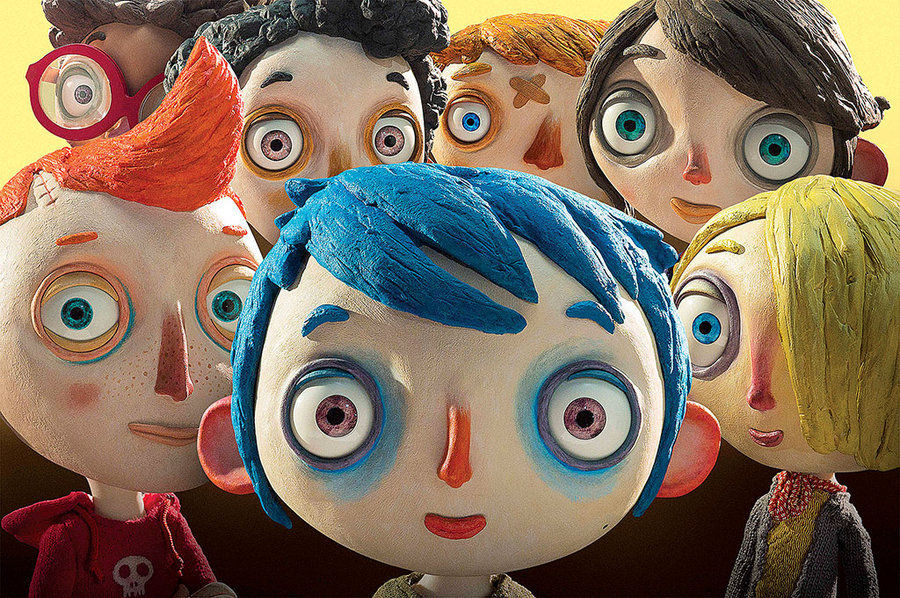
Подарете си вдъхновение
Най-интересните статии от изминалата седмица ви очакват! Всяка Неделя сутрин във Вашата пощенска кутия.